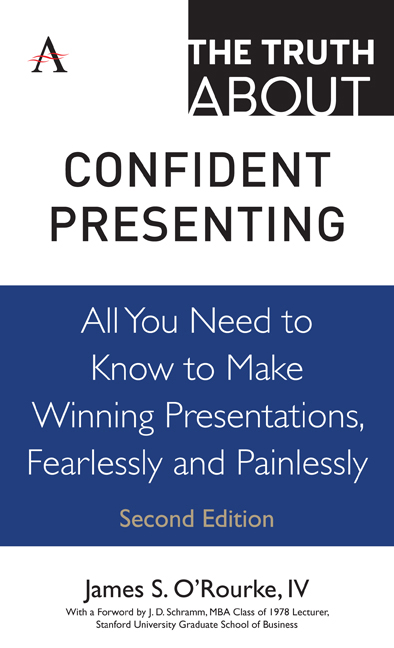 The Truth about Confident Presenting
The Truth about Confident Presenting Book contents
- Frontmatter
- Contents
- Foreword
- Introduction
- Part I Some Initial Truths
- Part II The Truth About Getting Ready to Speak
- Part III The Truth About What Makes People Listen
- Truth 13 Understand what makes people listen
- Truth 14 Your speaking style makes a difference
- Truth 15 Anticipate the questions your audience brings to your presentation
- Truth 16 Listening matters
- Truth 17 Being an active listener brings real benefits
- Truth 18 You can overcome the barriers to successful communication
- Part IV The Truth About Developing Support for Your Presentation
- Part V The Truth About Getting Up to Speak
- Part VI The Truth About Managing Anxiety
- Part VII The Truth About Nonverbal Communication
- Part VIII The Truth About Visual Aids
- Part IX The Truth About Handling an Audience
- Part X The Truth About What Makes a Presentation Work
- References
- Acknowledgments
- About the Author
Truth 16 - Listening matters
from Part III - The Truth About What Makes People Listen
- Frontmatter
- Contents
- Foreword
- Introduction
- Part I Some Initial Truths
- Part II The Truth About Getting Ready to Speak
- Part III The Truth About What Makes People Listen
- Truth 13 Understand what makes people listen
- Truth 14 Your speaking style makes a difference
- Truth 15 Anticipate the questions your audience brings to your presentation
- Truth 16 Listening matters
- Truth 17 Being an active listener brings real benefits
- Truth 18 You can overcome the barriers to successful communication
- Part IV The Truth About Developing Support for Your Presentation
- Part V The Truth About Getting Up to Speak
- Part VI The Truth About Managing Anxiety
- Part VII The Truth About Nonverbal Communication
- Part VIII The Truth About Visual Aids
- Part IX The Truth About Handling an Audience
- Part X The Truth About What Makes a Presentation Work
- References
- Acknowledgments
- About the Author
Summary
You understand how valuable communication is to the success of any business. And you also understand the value of skillful communication on a personal level. You make friends, establish relationships, pass ideas and accomplish the work that earns your living each day. Yet, strangely, the communication skill most central to your success in life is the one you're least likely to study in a formal way: listening.
Recent studies show that more than half of an adult's daily conversations are spent listening to someone else speak. Even though listening is clearly a crucial skill, few people know how to do so efficiently and effectively. Professor Ralph Nichols of the University of Minnesota warns us, however, that “… listening is hard work. It is characterized by faster heart action, quicker circulation of the blood, a small rise in bodily temperature.” The implication is simple: if you are not motivated to work at listening, you are not likely to improve.
Studies of listening skill repeatedly show that the average North American adult listens at an efficiency rate of just 25 percent. Your mother was right: for most people, literally three-quarters of what we hear goes in one ear and out the other. You retain and understand just a fraction of what's going on around you.
There is a substantial difference, though, between hearing and listening. On the one hand, hearing is merely an involuntary physical response to the environment. Listening, on the other hand, is a process that includes hearing, attending to, understanding, evaluating and responding to spoken messages. It's a sophisticated communication skill that can be mastered only with considerable practice. And though improving one's listening skills is difficult, demanding and challenging, it is also immensely rewarding.
Why have most of us become so resistant to careful listening? “It's because of our fast-paced world,” says Kathy Thompson of Alverno College. “We're always in a hurry. Mentally we're saying, ‘Get to the point.’ We don't have time to hear the whole story. We're running from house to job to store to church. Good listening takes time.”
That's part of it, according to Wick Chambers, a partner in Speechworks, an Atlanta communications-training firm. “But also, people think listening is boring; it's more fun to talk.”
- Type
- Chapter
- Information
- The Truth about Confident PresentingAll You Need To Know To Make Winning Presentations, Fearlessly And Painlessly, pp. 61 - 64Publisher: Anthem PressPrint publication year: 2019


